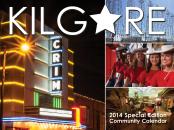
A True Patriot
By: J. Daniell Isaac
Harold Fuller, Jr., considers himself a true patriot. Growing up in his father’s house, that was the only way to live. “He was a typical sailor,” the Gregg County veteran remembers of his dad. “He didn’t mince any words.”
He followed his dad’s footsteps into the military, and it’s given him a 360-degree look at military service, how we should show appreciation for those who serve, and for the trauma that veterans bring back from combat.
Harold Fuller, Sr., was born in 1920. His son says Fuller, Sr., served in the Navy on the U.S.S. Utah at Pearl Harbor on Dec. 7, 1941.
“He survived that, barely,” Fuller, Jr., says. That morning, Japanese war planes struck the U.S.S. Utah on the portside with what is believed to have been three aerial torpedoes, and was sunk, according to the U.S. Navy. More than 60 officers and men were killed, including his father’s buddy.
“Him and his buddy we’re swimming and trying to get away from the ship that was going down,” Fuller, Jr., remembers of his father’s story about the attack. “They were climbing on the beach together, and the Jap plane came over and scraped them, killed his buddy right beside him, and they found him in the ditch the next morning in his underwear on the beach.”
Fuller, Sr., told his son the story one time and never repeated it to him again. “And he wouldn’t talk about it to me except when I got old enough to know what he was talking about,” he tells Kilgore Magazine. “He told me one time what happened, and after that, he wouldn’t talk.”
When Fuller, Jr., was 11 years old, his father had a nervous breakdown. He believes it was a result of what he witnessed and endured at Pearl Harbor. He knows his father suffered post-traumatic stress disorder, or PTSD, but it had a different name then.
“They didn’t know it was PTSD back then. They knew it as shell shocked, what they called it back then,” Fuller, Jr., says, “and he definitely had that.” His father died in 1988. He’s buried at a cemetery in Hallsville, where he lived.
PTSD has not only become the name for what was once shellshock, but the acronym has made headlines. The emotional scars of war and combat are being felt across America. A 2007 Marine Corps study found that military personnel diagnosed with PTSD were six times more likely to engage in antisocial or aggressive behaviors than those not diagnosed with PTSD. The disorder has felt close to home. On Sept. 12, a Gregg County veteran suffering PTSD committed suicide by throwing himself into oncoming traffic on a state highway in Lakeport, about eight miles east of Kilgore, according to local police.
More and more psychologists, behavior management programs and non-profit groups are working to stop PTSD’s deadly consequences on veterans and others. The Wounded Warrior Project, founded in 2003, raises awareness and enlists the public’s aid for the needs of severely injured service men and women; help severely injured service members aid and assist each other; and provide unique, direct programs and services to meet their needs. According to its Facebook social media page, “Staying informed and learning ways to manage and cope with what you’re experiencing are key in the readjustment process. Keep in mind that these post-traumatic reactions can present themselves at varying times and to varying degrees from individual to individual. If your reactions interfere with your life, do not improve, or worsen over time, please take the steps to get the help you need and deserve.”
If you or someone you know is or may be suffering from PTSD, the Wounded Warrior Project suggests you call 911, go to your nearest emergency room, or call 1-800-273-8255.
Fuller, Jr., was the oldest of six kids. He was and still is a lot like a description of his father. If you don’t want his opinion, you had better avoid him.
“He was a typical sailor. He didn’t mince any words,” he remembers of Fuller, Sr.
He believes that side of him, a mirror of his late dad, came forward after serving in the Air Force. In his parents’ house, he learned and practiced what he called true patriotism, “thinking that is what I was supposed to do, because I lived in this country.”
At 18, he joined the Air Force.
“The military made a man out of me. I was not very boisterous or very plainspoken before, and I am now, if they don’t want my opinion, then they better not ask me because I will tell them, I pull no punches,” he says. “That’s the way I am, and I don’t think I plan to change that.”
He went through training at Lackland Air Force Base, and then went to Amarillo for technical school before an assignment at a special weapons facility in New Mexico. There, he was an administrative specialist, and at Albuquerque, he was assigned to an Air Force major under the direction of a bird colonel.
“My job when I got there was to keep the conference room clear and clean, plus make sure all the video equipment was ready and operational to go, because the colonel was always giving classified briefings in these conference rooms,” Fuller remembers. He says it was a job that kept him so busy, he wasn’t able to earn more than three promotion levels instead of the usual five levels before he was sent to Vietnam in the 1960s.
“I was busy during that time trying to keep him happy that I didn’t get another level thing to get a five level. And when I got to Vietnam, they asked me, ‘Why didn’t I have a five level?’ I said, ‘Because I’ve been keeping a bird colonel happy.’ And I didn’t have to say anything else after that.”
After Vietnam, he was flown to Spokane, Wash., where he was discharged and flown home.
His arrival at what was then called the Gregg County Airport was anything but a celebration, he says. “When I come off the plane, when I got there, there wasn’t anybody to meet me, or anything okay? And the ones that were there were very degrading towards us, okay? And we have to swallow our mouths and just take care of business,” he remembers. “We had done what we were supposed to do, as well as I know.”
That wasn’t something for which the protesters seemed to care. He says that led some veterans to start organizing volunteer groups to welcome home soldiers who served their country, so they would know immediately on their arrival that their service is appreciated.
“I know they didn’t happen, and I am a witness that they didn’t happen,” Fuller says of welcome home events for soldiers in the 1960s and early 1970s. “But, I also know that when we came back and got treated the way that we were treated, and most of the vets and I have talked and said that this is not going to happen anymore. When they come back now, we are going to make sure they are welcomed home.”
Anne De Laet of Smith County founded Welcome Home Soldiers in 2007. It brings together more than 600 volunteers who come together at airports, train stations, restaurants -- wherever men and women of the military return home to East Texas, particularly the Tyler-Longview areas, including Kilgore.
Her vehicle is nicknamed the flag bus, because she carries dozens upon dozens of flags, passing them out to volunteers who meet her at welcome home events. Among them was June 18 in Liberty City, when De Laet and others joined family and friends of U.S. Army Specialist Christopher O’Neal when he arrived home after two years serving in South Korea.
“I was not expecting that. We pulled up, and I asked my mom, ‘Is this for Fourth of July weekend?’ She said, ‘No,’ and then I saw everybody standing out in the parking lot,” O’Neal said June 18. “It was definitely a surprise.”
“They don’t have to be coming home for any special reason,” De Laet says “We just want to be able to welcome them when they come home to let them know how much we appreciate them.”
After his discharge, Fuller, Jr. entered law enforcement. He started with Longview Police Department, serving as a walking patrolman on downtown streets during graveyard shifts for 10 months until attrition and seniority earned him a patrol car. After three more years on Longview’s force and fresh off a marital divorce, Fuller opted for a change of scenery. He went to Hot Springs for six years. His first five years in Arkansas were with the Hot Springs Police Department. He even earned honors one month for catching three armed robbers, he says. He then worked one year as a criminal investigator for an Arkansas sheriff’s office. It was a job he said he loved.
“You get to dig into the fact. You walk up to someone in plainclothes, ‘You’re under arrest.’ To me, that’s exciting, because they don’t know you’re coming.”After the sheriff lost his re-election bid, Fuller decided to return to Longview.
He was a member of Veterans of Foreign Wars Post 1183 in West Longview, but he later “got disillusioned,” he says. The lodge solicited volunteers for help, and Fuller signed up, but a commander - now deceased - told him that they didn’t want someone like Fuller “who blew hot and cold.”
Fuller says it was a slap in the face.
“Most of the guys out there were a lot younger than me. It kind of made me just upset that he said that. I don’t like to be treated as a step child, when I’ve done all I can do and want to do to help out,” he says. “I’m a people person. That’s why I like to help people.”
2014 Kilgore Chamber
Calendar of Events
View the Kilgore Chamber of Commerece 2014 Directory
View the Kilgore Chamber of Commerece 2014 Directory
View the Kilgore Chamber of Commerece 2014 Directory










